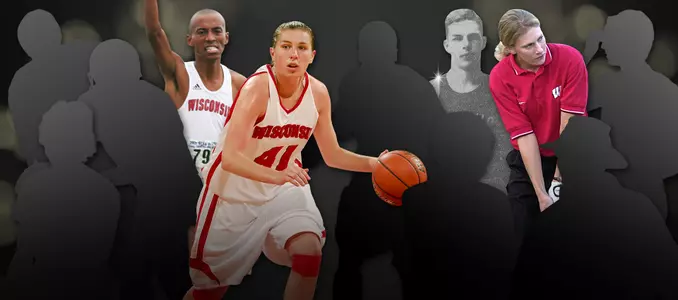
2018 UW Athletic Hall of Fame: Bill Chandler
July 12, 2018 | General News, Men's Basketball, Mike Lucas
National Player of the Year shined on basketball court and behind the bench
 |
||
|
BY MIKE LUCAS
UWBadgers.com Senior Writer
MADISON, Wis. — Nancy Wilkinson was delighted to take her son on a tour of the University of Wisconsin campus, especially since her husband had graduated from the law school here.
One of their stops was at the Camp Randall Memorial Sports Center next to the stadium on Monroe Street. Mounted on the south facing of the "Shell" are the UW Athletic Hall of Fame plaques.
"I went to the Wall of Fame thinking, of course, that grandpa would be on that wall," said Wilkinson. "He was in the Marquette Hall of Fame and I knew what his accomplishments were."
Wilkinson and her son checked out every plaque hanging in the Hall of Fame terrace.
"We looked and looked," she said before lamenting, "He's not there."
Wilkinson is the granddaughter of Bill Chandler who played basketball for two legendary Wisconsin coaches, Walter Meanwell and Guy Lowman. Both are in the UW Hall of Fame.
In 1918, Chandler was honored as the National Player of the Year by the Helms Foundation, the original creator of the award dating back to the 1904-05 season.
Chandler was the fourth Badger to be so recognized by the Helms Foundation joining Chris Steinmetz Sr. (1905), Otto Stangel (1912) and George Levis (1916). All three are in the UW Hall of Fame.
Only one other Wisconsin player in the 120-year history of the program has been named National Player of the Year and that was Frank Kaminsky, a consensus selection in 2015.
Chandler, a two-time all-league choice, starred on a couple of UW teams that won Big Ten titles.
In 1916, the Badgers were 20-1 under Meanwell and declared national champions retroactively by the Helms Foundation. In 1918, they were 14-3 under Lowman and tied for first in the conference.
Meanwhile, Chandler's accomplishments extended to the coaching ranks as a Meanwell assistant (1928-30) and head coach at River Falls (1919-1921), Iowa State (1921-1928) and Marquette.
In 1988, Chandler was inducted posthumously into the Marquette Athletic Hall of Fame. His induction class included two more contemporary players, Dean Meminger and Maurice "Bo" Ellis.
Chandler was also elected to the Helms College Basketball Hall of Fame based in Los Angeles where his name was engraved on a trophy alongside of UW teammates, Steinmetz and Levis.
Given this backdrop, Wilkinson had every reason to wonder why her grandpa had not yet earned a plaque on the Shell. But she was not about to give up hope that it might happen someday.
It was a short wait.
In May, Wilkinson's son — William Chandler Wilkinson who had received that personal tour of the campus years earlier from his mother — got his degree from Wisconsin.
"On our way to his graduation," she said, "I got the phone call."
Wilkinson was informed that her grandpa, Bill Chandler, was now a UW Hall of Famer.

"I just got goosebumps and tears in my eyes because it's so fantastic," she said. "I know his daughter is very, very honored. We're all so very thrilled."
The daughter, Caryl Chandler Herziger, who's in her mid-90s, lives in Neenah, Wisconsin. Wilkinson is hopeful that her aunt will be able to attend the Hall of Fame induction ceremonies in Madison.
Wilkinson never got to meet her grandpa.
Chandler died of a heart attack in 1953. He was 57.
"What I'm sharing," she said, "are the wonderful family stories and the things I know about him. He was beloved, kind, competitive. He was not only a good athlete, he was a magnificent person."
• • • •
Bill Chandler was one of the top prep scorers in the city of Chicago at Robert A. Waller High School (North Division). As a senior, the 6-foot-1 Chandler played center and scored 47 points against Senn.
Here's how one press dispatch characterized Chandler:
Dimpled Bill has played on the team for the last three years and captained it for the two preceding years. Throughout his career, he has been put out of only one game for fouling …
During the last season, he scored 180 points, making 23 baskets in one game (Senn), which remains a record in the Chicago high school league. As captain, he was an inspiration to the team.
Dimpled Bill? "He had a bright smile with dimples," Wilkinson confirmed.
Wisconsin was a natural landing spot for Chandler who followed in the footsteps of his father, Fremont Elmer Chandler, a pitcher on the 1886 Badger baseball team; and mother, a UW graduate.
Bill Chandler was a freshman captain for Meanwell, one of the most innovative coaches in the game. Former Wisconsin coach Bo Ryan was a huge fan of the 5-6 Meanwell who answered to "Doc."
"The more I read about him," Ryan said of Meanwell, who won eight conference titles and 70 percent of his games, "the more I realized that he had a proven system that his players ran.
"It was a system that revolved around cutting patterns and ball movement; a system that allowed him to sustain success for a long period of time.
"Doc's game was pass and cut. He really wasn't a big proponent of the dribble. But he brought structure, discipline and strategy to the game with implementation of shorter passes …"
Chandler, the junior class president at Wisconsin, was a perfect fit for the Meanwell system. In fact, this is how Meanwell described Chandler to the Milwaukee Journal.
He was one of the best all-around men I had ever seen," Meanwell said. "I wouldn't have been afraid to put him against some of these elongated players of today (He was talking about the late '50s).
He had capabilities with the ball that very few men had. He was powerfully built. He had a wonderful pair of hands. Under the basket, he was good for a sure two points.
Meanwell saw Chandler as a "member of my own family."
Bill Chandler was one of the finest men I have ever known," Meanwell said. "He had a splendid character. Everybody liked him. He was a marvelous man.
With the outbreak of World War I, Chandler went on to play for the Great Lakes Naval Station team that toured the country and went 31-4. Among his teammates was "Papa Bear" — George Halas.
Following his discharge, Chandler got into coaching at River Falls. After two years, he left for Iowa State where he was the head coach for seven seasons before getting the Marquette job in 1930.
Between living in Ames, Iowa and Milwaukee, he returned to Madison to get his Masters.
During his 21 years at Marquette, Chandler won 193 games (193-198) with the Hilltoppers (the team nickname between 1917-1954). Only Al McGuire has more wins (295-80) in school history.
Former UW coach Bud Foster had nothing but praise for Chandler in a 1953 interview in the Milwaukee Journal: When we played Bill's teams the competition was keen, but always sportsmanlike. I enjoyed the rivalry.
Ah, yes, the Wisconsin-Marquette rivalry.
Not only was Bill Chandler a UW graduate, but so was his wife, Viola, who was affectionately dubbed "Mrs. Coach" by the Marquette players. They adored her, especially her chicken dinners.
"He would rather beat Wisconsin than anybody else," said the Chandler's son, William Warren Chandler, who played five years for his dad at Marquette as a medical student in the wartime program.
Bill Jr. graduated from high school at 16, from Marquette at 20, from medical school at 23.
"He wasn't a Jr. but pretty much everyone called him Bill, Jr. because it was an easy thing to do it," Wilkinson said of her late father whose wife Paula was yet another UW graduate.
Wilkinson was a television news anchor for 12 years in Milwaukee and she estimated between 17 and 20 Badger grads over at least four generations fill out their family tree.
"It's such a long legacy of U-rah-rah (Wisconsin)," said Wilkinson, who got her degree at Valparaiso.
It surely made for an interesting family dynamic for Wilkinson because of her dad's ties to Marquette and her mom's to Wisconsin. Obviously, it was always a big deal when the schools played.
"We grew up never quite knowing who to root for," she said. "My mom conceded it might be better sometimes when Marquette wins because my dad and his Marquette buddies were less crabby."
Reflecting on her dad, a prominent surgeon for many years in Appleton, Wilkinson said, "We were basically raised on coaching principles.
"Play fair. Don't hot dog. Fundamentals matter. Be a gracious winner and not a sore loser. Be a team player. All those things were part of us. It has been in the fabric of our lives."
• • • •
While on the UW campus, Chandler roomed with one of his Badger teammates, Harold Olsen. They lived in the northeast turret of the "Old Red Gym" — the armory/castle on Lake Mendota.
Years later, Chandler and Olsen combined forces as influential head coaches. Among his stops, Olsen coached 24 years at Ohio State and won 259 games and five Big Ten championships.
In 1938, Chandler was the president of the National Association of Basketball Coaches. Olsen pushed the NABC to sponsor a postseason event to compete with the National Invitational Tournament.
That materialized in 1939 as Northwestern hosted the championship. The NCAA liked the idea so much, it took over the tournament from the NABC the following year, the genesis of March Madness.
Chandler was creative about potential basketball rules. And served on the NCAA committee.
Few men have earned more universal respect and affection during their life-time than did Bill Chandler, wrote Wisconsin State Journal sports editor and columnist Henry J. McCormick.
He was the kind of man any school would be proud to have as an alumnus …
That any school would be proud to have as a member of its instructional staff …
That any man would be proud to own as a friend.
As a star player at Wisconsin, Chandler had a feel for the game.
As a coach at Marquette, he had the pulse of the game. He never shied away from scheduling tough opponents. But he never made it too big. He never stopped teaching.
Chandler left many admirers behind, notably those who played for him. To honor his memory, Milwaukee Journal columnist Bob Wolf quoted some of Chandler's former players.
He thought of us as human beings rather than athletes, said Jim O'Connell.
He was proud to put us into the professional world as men, said Gene Berce.
He taught basketball the way it should be played, said Dave Quabius.
And, lastly, this from former Marquette trainer Bob Weingart, Men like him come along once in a lifetime. Dignity, honesty, courage — there just aren't enough adjectives to describe this man.
This is the man, Wilkinson's grandpa, who will have his plaque in the UW Athletics Hall of Fame.
UW Athletic Hall of Fame Class of 2018
- Jolene Anderson, women's basketball
- Simon Bairu, men's cross country, men's track and field
- Allie Blomquist, women's golf
- Bill Chandler, men's basketball
- Next member announced July 13













